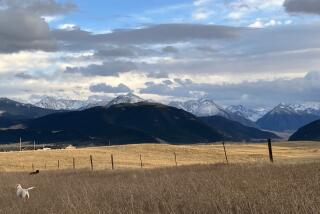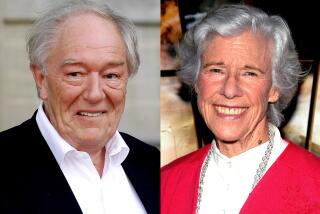COMPANION TO ‘PRAIRIE’ LOVERS ENDS HIS REIGN
- Share via
ST. PAUL, Minn. — Garrison Keillor shut down Ralph’s Pretty Good Grocery, Bertha’s Kitty Boutique and the Chatterbox Cafe with style and grace Saturday, declining to accept “cheap bronze plaques” commemorating his 13-year run as host of radio’s “A Prairie Home Companion” and returning to the stage for no fewer than a half-dozen encores following his final public appearance.
Outside the World Theatre where the gangly, iguana-eyed radio personality has performed for nearly a decade, the mayor of St. Paul, George Latimer, released 10,000 yellow, orange and blue balloons and a local theater troupe serenaded Keillor. A crowd of 500 strong women, good-looking men and above-average children jockeyed for a glimpse of their departing hero while a brass band played.
It was wholesome Americana: a scene straight out of “The Music Man,” “Our Town” . . . or “Blue Velvet.”
The 44-year-old storyteller--hailed as the new Mark Twain--told a sold-out audience several times during the 2 1/2-hour show that he would miss them more than they would miss him. He packs for Denmark next week, where he claims he will resume his life as a shy, retiring writer of fiction.
With his backup orchestra and the show’s soloists playing a spate of melancholy melodies ranging from “Remember Me” to “Till We Meet Again,” his farewell radio program very nearly crossed over the line from the climax of a broadcast phenomenon to a sentimental sob fest.
Handkerchiefs and Kleenex came out all over the tiny World Theatre when Keillor sang farewell to Lake Wobegon in his low flannel voice:
“I looked back and shed a tear, to see it in my rear-view mirror, I said I’d just be gone a couple weeks, and now it’s been 30 years,” he sang.
Lake Wobegon, “The little town that time forgot,” sprang from Keillor’s own tragic-comic memories of his Midwestern fundamentalist upbringing just 50 miles north of St. Paul in suburban Anoka County.
But that all changed after his national radio audience grew in recent years to more than 3.5 million listeners. After more than a million sales of his novel, “Lake Wobegon Days,” in 1985, Keillor and his sad little Minnesota town became more American than Mayberry, Muncie or apple pie.
The Disney Channel has been televising the show since March, and fan mail protesting the demise of “A Prairie Home Companion” has poured in by the bag load at Minnesota Public Radio, the show’s producer. Director Sydney Pollack bought the film rights to the novel and explored upper Minnesota with Keillor some months ago in search of the non-existent town and its archetypal residents for the purposes of making a movie.
In its most recent tour books, even the American Automobile Club has felt compelled to print a descriptive paragraph, warning summer travelers not to go searching for Lake Wobegon because it exists “only on a popular Saturday night radio program.”
But true Keillor fans are undaunted by such facts. What they are after, says Van Nuys resident Don Browne who personally paid more than $1,000 for tickets, air fare and hotel charges to see the last show, is Truth with a nostalgic capital T .
“I first heard the show in June of 1980 and I immediately went to the library looking for Lake Wobegon,” said the UCLA research scientist. “They can say it doesn’t exist, but there’s a lot of it right here (in St. Paul). Everything’s a lot simpler, a lot more honest. You try to cash a check in Westwood, they ask you for three pieces of ID and a blood sample. But it’s not like that here at all.”
In Lake Wobegon, Bob’s Bank operates out of a green mobile home on Main Street, “where your money is safe and the door is always open,” according to a “commercial” that aired from time to time on “A Prairie Home Companion.”
Every check issued by the bank carried both Bob’s picture and the inscription: “Cash this. They’re friends of mine,” according to Keillor’s vision.
Garrison’s friends flocked in from all over the United States this last show: Philadelphia; Shreveport, La.; Honolulu; Los Angeles. . . . In fact, there were very few from St. Paul or Minneapolis in the audience. When he asked for a hand from his fellow Minnesotans in the audience, the applause was scattered.
Carroll and Joyce Lehman drove all the way from Keene, N.H., to see the last of Keillor and counted themselves lucky to get $100 tickets. What more wholesome way could they spend their 22nd wedding anniversary.
“It was wonderful! It was just wonderful!” Joyce squealed.
“She grew up in Iowa and she says that Garrison knows just how it was,” Carroll Lehman said of his effervescing mate.
Nobody at the Minnesota State Polka Festival stopped their dancing Saturday night to tune in for the Lake Wobegon eulogy. Schmidt beer, flute and accordion notes sloshed until after midnight at the Bel-Ray Ballroom in Mounds’ View, and nobody knew or cared much that Garrison Keillor was no more.
It was business as usual at Taco John’s on University Avenue in West St. Paul. The Twilight Taco Special (two tacos for 80 cents) was on at 5 p.m., but “A Prairie Home Companion” was not.
There was talk of business and banking and insurance sales in the Eric the Red Room of the Sons of Norway hall in South Minneapolis, but no laments for the passing of Lake Wobegon, home of the mythical Sons of Knute.
“I’ve never heard him, but I kind of get the impression that a lot of people may miss him,” said Sons of Norway executive secretary Phyllis Ower.
It’s not that Minnesotans are ungrateful to Keillor or insensitive to his sentimentalism. It’s just that most of them have forgotten the little town that Keillor remembered, if they ever knew it existed at all.
The Lake Wobegon inspiration is all around St. Paul, but the Truth that Don Browne and the Lehmans and the other 3.5 million “A Prairie Home Companion” fans put aside each Saturday night was that Keillor only poses as a citified country bumpkin. He enjoyed his first national success as a high-minded, low-key satirist for the New Yorker magazine 17 years ago, not as a Twin Cities DJ.
His real audience, ironically, has grown to include the upper-middle-class young professionals across the country and not necessarily the natives of Minnesota.
The Twin Cities have no Chatterbox Cafe--the social center of Lake Wobegon--but there is the Chatterbox Tavern on East 35th Street. There, too, Keillor is a prophet without honor in his own Wobegon country.
With its Pabst on tap and pickled eggs behind the bar, it could be a composite of the Chatterbox Cafe and Lake Wobegon’s Side Track Tap, which operates in Keillor’s imagination as a beer joint that hasn’t had a new hit on the jukebox since Bing Crosby died.
Keillor’s tavern is run by Wally and Evelyn, but the real Chatterbox on East 35th Street in Minneapolis is run by Homer and Jeri.
“My dentist mentioned Garrison Keillor to me once,” Jeri recalled on Saturday afternoon. “One time, I listened to it a little while, but I couldn’t get into it.”
There is no jukebox in the real Chatterbox, but there is a pool table, a cigarette machine topped by two dozen dust-laden baseball trophies and a grainy old color TV over the bar where the neighborhood patrons watch Twins games or sitcom reruns from 5 to 7 p.m. on Saturdays when “A Prairie Home Companion” airs on radio.
“I heard on the television that he’s retiring,” said Don, a flaccid Chatterbox patron. “He’s got one of them cornball shows on radio, but I don’t know anybody who listens to the radio these days. Do you?”
Father Wajda, pastor of Our Lady of Perpetual Help near the University of Minnesota campus, listens occasionally. He isn’t grief-stricken by Keillor’s departure, but he did recognize the national attention that “A Prairie Home Companion” focused on Minnesota--publicity that Father Wajda believes has given the state a new kind of self-respect.
He has no comment on the satirical shots that Keillor has taken at Lake Wobegon’s own Catholic Church, Our Lady of Perpetual Responsibility.
“I must have missed those shows,” he said wryly.
Neither Minneapolis nor St. Paul have a Ralph’s Pretty Good Grocery Store, but they do have Ralph’s and Jerry’s Market.
“A lot of us listen to it,” said Ralph Hanson. “I think about 60% of the people who work here listen to it. I wish it would stay on the air longer, but I guess it just can’t.”
And how long has Hanson owned the store?
“Oh, I don’t own it. Ralph and Jerry sold out a long time ago to a guy named Richard. The manager’s name is Ed. I’ve only worked here about three months, running the till and stocking shelves,” said Hanson.
Ralph’s and Jerry’s Market does not sell Powdermilk Biscuits, Ralph said, but it does sell pretty good groceries. On Saturday, with temperatures in the Twin Cities hitting 99 degrees, the biggest selling items at Ralph’s and Jerry’s Pretty Good Groceries was beer, pop and wine coolers.
Ralph Hanson had to work late and missed the last of Lake Wobegon on the radio.
Keillor spun his final weekly report of the news from Lake Wobegon by freezing Mayor Clint Bunsen, Pastor Ingqvist, a half-dozen Norwegian bachelor farmers and all the rest of his Minnesota characters in the timeless fantasy of a quirky wholesome town that disappeared amid freeways and fast-food franchises long before Keillor decided to abandon his show and go to Denmark.
In his finest storytelling hush, Keillor told his audience that the last day he spent in his imaginary hometown was Wednesday, June 10, 1987.
It was raining, ending a long spring drought. A great long rain, he called it.
Everyone crowded into the Chatterbox Cafe because it was that kind of day--a cream of mushroom soup and toasted cheese sandwich kind of day in Lake Wobegon. With Keillor’s voice growing quieter and more confidential with each sentence, he described in loving detail how the rain turned into a surrealistic mist as his characters faded from view.
“And here it is. This mist. You could get to anywhere you wanted to get in it,” he told his rapt and weepy audience. The talk in the cafe had turned to the planting of the last sweet corn, now that the drought was done. The great, long rain would mean that the crop would not fail, the river would rise and it would be possible to sail on down the river and see at last what was around the bend.
Outside the World Theatre on Saturday it was a hot, muggy June afternoon. Inside, it was cold and misty and the 925 people who watched the last show shared a final grilled cheese sandwich with Keillor before he said goodby.
“That’s where I leave them,” he said. “If you see them, give them my best and tell them I think of them. That’s the news from Lake Wobegon.”
More to Read
The biggest entertainment stories
Get our big stories about Hollywood, film, television, music, arts, culture and more right in your inbox as soon as they publish.
You may occasionally receive promotional content from the Los Angeles Times.










